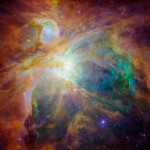We run our website the way we wished the whole internet worked: we provide high quality original content with no ads. We are funded solely by your direct support. Please consider supporting this project.

The Risk of Love
The most basic and yet most profound teaching of the Bible is that “God is love” (1 Jn 4:8; 16). He is revealed to be a God who is triune—Father, Son and Holy Spirit (See Mt 3:16; 28:19, Jn 14:26; 15:26)—who’s very essence is an eternal, loving relationship. He created the world out of love and for the purpose of expanding his love.
God the Father desires that we dwell in Christ and Christ dwell in us, just as Christ dwells in the Father and he in Christ (John 17:21-26). The Father wants us to participate in and reflect the loving union that he has with Christ. The goal, in other words, is for the perfect triune love of God to be manifested to people, replicated in people and reflected back from people. This is why God created the world. The whole of creation is meant to express and embody the eternal triune love that God is. It exists to glorify God.
Humans are to glorify God by expressing his love and authority as we rule the earth. God wants to be Lord over all creation, but because he is the triune God of love, he doesn’t want to do this unilaterally. Of course he could have created a world where we have to do his will, but it would have been a creation devoid of love. Instead, God wants to rule creation through coregents, free agents who through love apply his sovereign will to the earth. God therefore created us “in his image” that we might “have dominion” and “subdue” the earth (Gen 1:26-28).
In such a world, there is risk because love must be chosen. Unless people can choose not to love, they can’t genuinely choose to love. The possibility of the one is built into the possibility of the other. Love simply cannot be coerced or programmed into people.
A creation in which love is the goal must incorporate risk. Creation doesn’t have to have actual evil, but it must allow for the possibility of evil—if the possibility of genuine love is to exist.
This is why God commanded humans to have dominion over the world in the creation story. If we weren’t free to disobey God, a command would be unnecessary; we would do what God created us to do automatically. Because God wants his will carried out in love, he empowers humans to carry out his command freely. And this, of course, means we can refuse to carry out his command if we choose.
God gave Adam and Eve free will in the Garden. The purpose of this freedom was that they might choose to remain in loving union with God. But because it was a union of love, it had to be possible for Adam and Eve to reject it. Tragically, the first couple chose to disobey God, thereby bringing judgment on themselves and their descendants (Gen 3:1-19). This disobedience was not part of God’s original plan; it was a rejection of God’s plan. Yet the possibility of this rejection had to exist if God’s original plan was to be possible. His plan is for people to administrate his creation as they receive, replicate and reflect back God’s triune love.
—Adapted from Is God to Blame?, pages 62-65
Related Reading

A Brief Theology of the Trinity
“The economic Trinity is the immanent Trinity, and the immanent Trinity is the economic Trinity.” This is the maxim introduced by the Catholic theologian Karl Rahner that should shape our discussion of the Trinity. It is simply a short-hand way of saying that since the way God is toward us in Christ truly reveals God,…

The Open View and Predestination
Paul wrote in Ephesians, “For he [God] chose us in him before the creation of the world to be holy and blameless in his sight. In love he predestined us for adoption to sonship through Jesus Christ …” (Eph 1:3-4). Some argue that the particular way Scripture portrays God’s providential plan is incompatible with the…

Glorious Creation
I’m not a scientist, but I’ve always loved to dabble in it. In fact, I collaborated with some friends and wrote a quirky picture book on the interfacing of various areas of science (e.g. quantum theory, chaos theory) and the open view of the future. It’s called The Cosmic Dance and, just to let the…

God is Not What You Expect
Jesus came, in part, to finally reveal the absolute truth about God. He is the way and the truth (alethia) and the life (Jn 14:6). The word “truth” means “uncovered.” And what we find once God is uncovered is that he’s completely different than what we fallen humans generally expect God to be. As we…

How do you respond to Romans 9?
The Deterministic Interpretation of Romans 9 Many people believe that Romans 9 demonstrates that God has the right and power to save whichever individuals he wants to save and damn whichever individuals he wants to damn. I’ll call this the “deterministic” reading of Romans 9, for it holds that God determines who will be saved…

The Law of Love
Without love, absolutely nothing is of any significance. Paul made this point when he wrote: If I speak in the tongues of men or of angels, but do not have love, I am only a resounding gong or a clanging cymbal. If I have the gift of prophecy and can fathom all mysteries and all…
